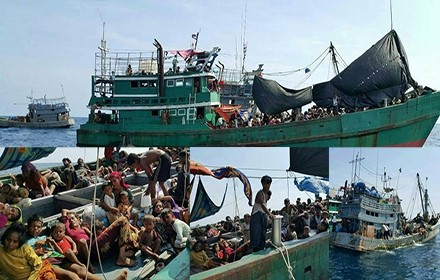The other under-reported side of the story about the stateless Rohingya people
There is the other side of the story about the stateless Rohingya people in fishing boats which have been drifting in the Andaman Sea waiting for a chance to come ashore and those who have been held in custody of Thai police for illegal entry.

According to well-informed Thai intelligence sources, about half of the so-called Rohingya people whose plight have become newspaper headlines for months now are, in fact, Bangladeshis, and many of the Rohingya people themselves did not originate from Myanmar’s Rakhine or Arakan state but from Bangladesh’s Cox’s Bazar, a fishing port with its over 100 miles long uninterrupted beaches that the Bangladeshi government has wanted to turn into an international tourist destination.
Also, most of the Rohingya boat people or migrants who are now the focus of international attention are voluntary victims of human trafficking gangs who paid the gangs to bring them out of Myanmar or Bangladesh to third countries such as Malaysia and Indonesia so that they can, hopefully, find jobs and begin a new life.
The Thai intelligence sources said that there is a huge camp for the Rohingya people in Cox’s Bazar under the supervision of the UNHCR. The camp is capable of accommodating up to about 300,000 people but only about 20,000 Rohingya people are in the camp.
So, the sources said that the UNHCR should also be responsible for solving the plight of the Rohingya boat people too because they have failed to prevent the Rohingya people from leaving the camp in the first place.
The ideal solution, according to the sources, is to have the boat people sent back to the UNHCR’s care in Cox’s Bazar and this issue should be raised in the international conference scheduled on May 29 in Bangkok.
The sources then gave some backgrounds about the history of the Rohingya people and related human rights problem.
Rakhine or Arakan state of Myanmar used to be an autonomous state but, most of the time, it fell under the alternate control of the Burman or Bengali kingdom until the British empire colonalised the entire South Asia as well as Bburma or Myanmar.
Since Arakan state shares the common border with Bangladesh, British colonialists, during the colonial period, settled many Rohingya people from Bangladesh in Arakan state much to the resentment of the local people.
In 1948, Burman was given independence by the British empire with the Arakan declared an autonomous state. However in 1962, General Newin staged a coup to seize power in Burma and incorporate Arakan state as part of Burma while denying citizenship to the Rohingya settlers.
Meanwhile, Bangladeshi also refuse to accept the Rohingya settlers in Burma or Myanmar their citizens.
Widespread clashes between Rohingya people and the Burmese three years ago have accelerated the flight out of Myanmar by the stateless Rohingya people ever since.
